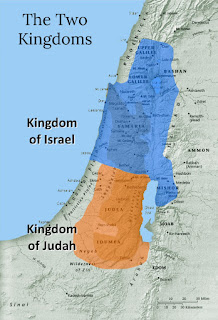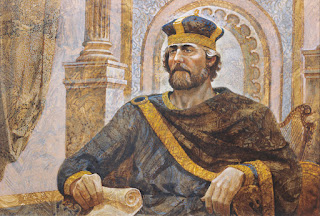One man's literary pilgrimage through the hills and valleys of the Word of God.
Saturday, January 18, 2020
2 Samuel 2 - The Divide
It seems David's path to the throne has hit another stumbling block. After Saul's death, David is only initially able to secure the loyalty of the kingdom of Judah. Saul's son Ish-bosheth (with the help of Saul's general Abner) becomes king of the rest of Israel. Based on the narrative direction of the First Book of Samuel, this isn't the outcome I would've expected. David's ascent has been steady, his only hurdle being Saul himself. He seems as one revered by the people. And his kingship was all but inevitable once Saul left the picture. But where there is God's Will there will always be a force at work against It. The forces, gathered from a place of darkness, do not want David to be king. The Israelites are thus left divided for some time before things break into hostilities. And this is the bulk of 2 Samuel 2. The scenes are striking. First, the clash of the 24 warriors. 12 of David's men, 12 of Ish-bosheth's, like gladiators fighting to the death. They are all slain in the conflict and nothing is accomplished. Then the generals Abner and Joab, fighting on behalf of their kings. The death of Asahel escalates things. Abner's men defeated, and his ignominious march back home. By the end of the chapter it is clear David has the upper hand. But the kingdoms aren't united. The armies are bickering. Joab's brother slain. Animosities flaring up. The transition from Saul to David appears to be anything but a smooth one.
Wednesday, January 15, 2020
2 Samuel 1 - David's Magnanimity
The Second Book of Samuel starts right away with David. King David, as he ought to now be called, shows great magnanimity when met with the news of Saul's death. Saul, the great persecutor of David; Saul, the man obsessed with eliminating David; Saul, the king who saw David as a threat and came close many times to killing him. If anyone should be relieved and even happy to hear that Saul was dead, it would be David, who would no longer need to worry every moment about Saul conspiring to end his life. But no, David reacts with sorrow over the news and immediately rends his garments and weeps and even fasts. Of course, David's sorrow was also directed towards Jonathan, whom he loved dearly. But all the same, David shows no malice, no vengeful joy, no satisfaction at the news. In this moment, David shows himself to be very much a prefigure of Jesus, forgiving his enemies. And Saul, sadly, plays the part of the Jews, in this way: He was anointed first, by the holy Samuel, divinely chosen, much was expected of him, but he failed, was overcome with pride, and when God chose David as the new king, Saul would not accept him.
Saul also demonstrates for us that just because God chooses someone, even bestows graces on him, and elevates him to a prominent position with an important mission, that person can still fall. Free will does not cease to be just because someone is granted a special position by God. Saul, had he not chosen the path of pride, could have been a holy and exalted king. Instead he prefigures Judas.
Saul also demonstrates for us that just because God chooses someone, even bestows graces on him, and elevates him to a prominent position with an important mission, that person can still fall. Free will does not cease to be just because someone is granted a special position by God. Saul, had he not chosen the path of pride, could have been a holy and exalted king. Instead he prefigures Judas.
Subscribe to:
Posts (Atom)

